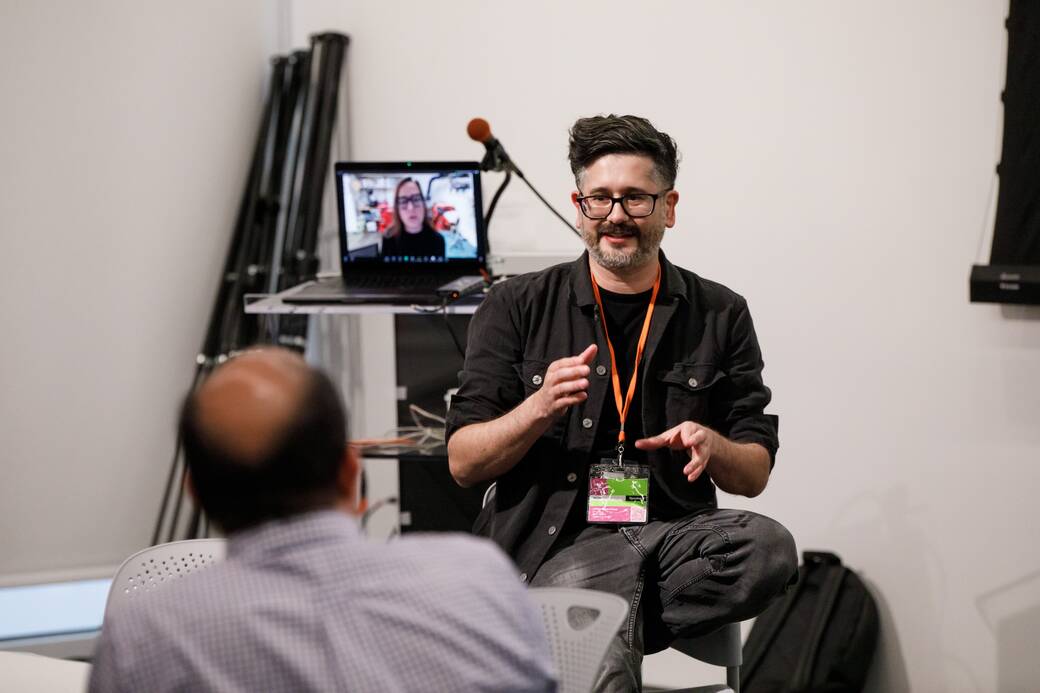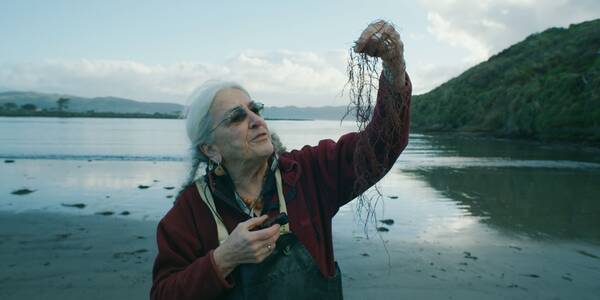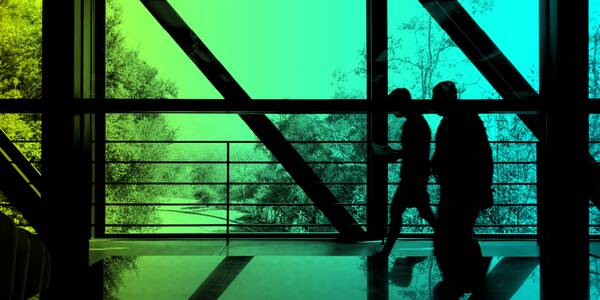Educators went big and bold at ArtCenter for 2024’s AICAD Symposium
The annual gathering on teaching and learning in art and design included inspiring sessions by ArtCenter faculty, staff, students and alumni, and keynote speaker Safiya Noble
How can educators prepare students for teaching, learning and working in 2024? Where do educators look for guidance and inspiration in this current educational landscape?
These questions and many more were addressed at the recent three-day AICAD Symposium—the annual Association of Independent Colleges of Art and Design (AICAD) gathering on teaching and learning in art and design—held this year at ArtCenter.
The 2024 symposium titled Teach for Tomorrow: Re-Designing the Future featured sessions and workshops—including many led by ArtCenter faculty, staff, students and alumni—that explored four major threads: Artificial Intelligence, Machine Learning and Emerging Technology; New Learners and New Pathways; Pedagogy and Practice; and Graduate Education and Research.
Safiya Noble, educator and author of the book Algorithms of Oppression: How Search Engines Reinforce Racism (2018, New York University Press), presented as keynote speaker. The symposium also included the special panel discussion “Data in the Digital Age,” featuring artists and designers at the forefront of data visualization practice and education.

The Role of AI
On the first day of the conference, Ivan Cruz (BFA 11 Graphic Design), who teaches in ArtCenter’s Interaction Design program, and Carla Diana, who created the Interaction Design program at Cranbrook Academy of Art, led the session “AI Collaborator: Shifting from Structured Projects to Open Exploration in Creative Education”—part of the symposium’s Artificial Intelligence thread—in the Flex Space of ArtCenter’s Mullin Transportation Design Center (MTDC).
In Cruz’s half of the session, the motion designer and technologist shared with a packed audience how he structures his upper-term Generative Design course. In the course, Cruz has his students work on three projects; the role that AI plays changes as the students progress through the assignments.
In the first project, students use generative programming to create album artwork, and AI functions as a tutor. “In this first project, the students start understanding variables, fundamentals, programming and the AI,” said Cruz. “I tell them it’s okay to use AI like ChatGPT and Gemini, but don’t let it code for you. You wouldn’t ask your tutor to do your homework.”
In the second project, students create visuals for an event—interactive posters for a music festival—and the AI functions as a developer. “When [my students] graduate, they’re not going to be coding,” said Cruz. “They’re going to be working with developers.”
In the third project, students create a brand extension and the AI acts as a collaborator. “How do you validate your ideas?” said Cruz, who said that AI is particularly helpful when it comes to understanding the needs of different audiences. “[Students] can tell ChatGPT to become a specific audience and then have a conversation with that audience. It’s very interactive.”

For Diana’s portion of the session, which she conducted via Zoom, the artist, educator and author of My Robot Gets Me: How Social Design Can Make New Products More Human (2021, Harvard Business Review Press) shared examples of student work that show how her students are using AI to help them reach new levels of interactivity.
“Cranbrook has a history of craft, and [the Interaction Design program’s] craft is form, code and electronics that manifests in sound, light and movement,” said Diana, before sharing examples of the types of projects her students create. “AI levels the playing field for learning in this really challenging environment. [Our program] has a wide range of student demographics. We have folks from 22 years old to 62 years old, and they come from lots of different backgrounds.”
Diana shared work from her student Jessica Harvey, who came to Cranbrook with a woodworking background, is interested in capturing what it means to be human through kinesics, and had never before worked with electronics. On her own, Harvey began working with Arduino boards and ultrasonic sensors, thanks to prompts she would enter into ChatGPT. But when she hit stumbling blocks, she would turn to Diana for help.
“[AI] is a powerful starting point, but knowing how to troubleshoot is just so incredibly valuable,” said Diana. “There’s a lot of trial and error, there’s a lot of understanding physicality, understanding presence and understanding relationship to the body that you don’t get from screen interaction.”

Building Meaningful Collaborations
“We center community values, social change and advocacy where we center community needs and wants, and that goes hand in hand with design, research and ethics,” said Jennifer May, executive director of ArtCenter’s social innovation department Designmatters, as moderator of the Pedagogy and Practice session “The Pedagogy of Partnership: Building Meaningful Collaborations in Art + Design Education.”
Held in the MTDC, the session focused on the ongoing six-year partnership between Designmatters and the Cedars-Sinai Cancer Research Center for Health Equity, and Designmatters’ ongoing more than decade-long partnership with Coaniquem, a Santiago, Chile-based nonprofit pediatric medical burn facility. The partnerships revolve around Designmatters’ Transdisciplinary Studio (TDS) courses, in which students from different academic departments collaborate.
“The opportunities and challenges in bringing together different worlds—worlds of partners, classrooms and programs—is this issue of mutuality,” said panelist and Designmatters Assistant Professor and Faculty Director Joshua Halstead (BFA 22 Graphic Design), who co-taught the 2023 course Igniting Local Change: LGBTQ+ Advocacy for Health Justice, in partnership with Cedars-Sinai. “Who gets to decide the direction of the class? It's everyone involved, including the students.”
Panelist and undergraduate Graphic Design Associate Chair Monica Schlaug and panelist and Corcoran School of the Arts and Design Assistant Professor Nidhi Singh Rathore (MFA 19 Media Design Practices), a former Designmatters fellow, reflected on the 2022 studio The (Re)Search for Inclusive Healthcare that Schlaug taught. ArtCenter students designed a campaign to encourage L.A. Latinx and Korean community members to consider participating in clinical trials.

For panelist Ghecemy Lopez, Cedars-Sinai Cancer Center’s program administrator of Cancer Navigation, Survivorship, Advocacy and Clinical Trial Engagement, the students she’s met are “geniuses,” she said. “Their creativity is always helpful and inspiring for us as health providers. In many of the communities that we're serving, art is a common ground. So many of our patients find healing through art.”
Designmatters’ partnership with Coaniquem launched with the 2013 studio course The Healing Cloud, in which students developed Coaniquem’s sweet and longtime mascot, Santi the cat.
Panelist and Spatial Experience Design Associate Chair Stella Hernandez (BS 11 Environmental Design), who has taught or co-taught nearly every Designmatters Coaniquem studio course, pointed out that students gain real-world experience by staying for two weeks in Chile and experiencing day-to-day life on the Coaniquem campus.
“The students really respect the work that has been done before by other students, and they wanted to build on that,” she said. “Every time that we go to Chile, we have a different challenge and talk in advance with the partners.”

Hands-on Workshop
Meanwhile, in the Maker Lab at South Campus’ 870 building, several conference attendees participated in the session “Interdisciplinary Dialogue as Zine: A Publishing Workshop,” part of the conference’s Graduate Education and Research thread.
Graduate Media Design Practices faculty Elise Co and Graduate Art Associate Chair Gabrielle Jennings led the workshop, which was inspired by a Spring 2024 studio course, ArtCenter Graduate Press, they co-taught.
“We as different departments [Graduate Art and Graduate Media Design Practices], with different practices and pedagogies, were finding ourselves talking about the same issues,” said Co, explaining the genesis of the course. “We had been talking about the importance for [students] to format their work in a way that could be disseminated.”
“Years earlier, I had started doing an artist book workshop class with my Graduate Art students,” said Jennings, touching on one of the inspirations for the ArtCenter Graduate Press course. “I felt there was a need for them to understand the history of artist books and to see where there might be a place for publishing in their practice.”

The studio provided an opportunity for graduate students to communicate their work and thesis ideas, and to further that research through engagement with the public. Through a collaboration with the Illustration department’s Maker Lab, students produced a cross-disciplinary publication, utilizing the Riso printing and binding methods available in the facility.
In the AICAD workshop, attendees from institutions including ArtCenter, the School of the Art Institute of Chicago, and Otis College of Art and Design, got their hands dirty, using markers, Post-its and scissors to engage in a lively discussion as they created a collaborative work.
The participants wrote and drew, first, about the methods in which they currently disseminate information about their respective institutions, and secondly, alternative methods they have yet to try. Participants were encouraged to annotate others’ ideas with a different set of markers.
In the end, each participant took home a pair of vibrant, neon-colored risograph prints that captured the spirit of the conversation and which could be taken back to their respective institutions to spark additional discussions.

The Data Dilemma
On the second day of the AICAD Symposium, the afternoon panel discussion “Data in the Digital Age” featured artists and designers at the forefront of data visualization.
The panel was moderated by Maggie Hendrie, dean of ArtCenter’s Media and Technology division, and included two co-founders of the Data to Discovery initiative—Santiago Lombeyda, ArtCenter faculty and a senior computational scientist at Caltech’s Center for Data-Driven Discovery, and Hillary Mushkin, ArtCenter faculty and a research professor of art and design at Caltech—and Jason Forrest and Jen Ray of Data Vandals, artists-in-residence in ArtCenter’s Designmatters program for the Fall 2024 term.
Lombeyda and Mushkin shared examples of works that have come out of Data to Discovery, an initiative based at Caltech, NASA/JPL and ArtCenter that focuses on co-designing advanced interactive visualization systems that help scientists make discoveries.
These include R-Sketch, a data visualization tool that helps engineers who drive the rover on Mars determine the safest and most efficient path for the robot to take. “We created a tool that’s web-based,” said Lombeyda of R-Sketch. “They can actually go there, look at the maps, drag paths and they can actually see the information—the roll, the yaw, the pitch—how dusty the ground is … and literally just drag the rover and move locations.”

“In the simplest way, we build artworks from the data that structures our lives,” said artist Ray of Data Vandals, a data visualization art collective led by husband-and-wife Ray and Forrest that use sculpture, performance, music and design to drive accessible visuals. “We use data to focus on people. What we’re trying to do is begin and continue conversations.”
Ray and Forrest shared examples of several of their community-focused art projects, including their recent installation Hello from the Data Vandals at the Civic Projects Lab at The Cooper Union, which looked at New York City’s East Village neighborhood through data past and present. This included a work that playfully highlighted the current cost of property in the area: a 3D frame of a 28-square-foot shed asked its viewers, “Wanna buy this for $48,132.00?”
“People ask me all the time, ‘How do you know if you have a good data visualization?’” said Forrest. “Because it’s resulting in the kinds of conversations you’re looking for.”

Later that evening, keynote speaker Noble presented to a packed crowd at ArtCenter’s Ahmanson Auditorium on the Hillside Campus. UCLA’S David O. Sears Presidential Endowed Chair of Social Sciences and Professor of Gender Studies, African American Studies and Information Studies, Noble spoke about the impact and potential harm—social, racial, gender-based and environmental—of AI, her work on algorithmic discrimination, and advocating for better futures.
After the presentation, ArtCenter Provost Anne Burdick engaged Noble in a conversation on stage, followed by questions from the audience.
“I wrote this book, Algorithms of Oppression, and it was a way to demonstrate what I kind of already knew, but also wanted to deepen my knowledge around, which is, ‘What are the stakes of something like a search engine?’” said Noble during her presentation. “Really, it was a proxy for many other kinds of technology. What are the political ramifications of these technologies?”

“With what was at first a dissertation in 2012, I can remember that it was almost impossible to find four people who would sit on a dissertation committee and put their names on the line around my work, and say, ‘Yes, an algorithm could be racist or sexist,’” she added. “That values could be embedded in the code, and that people who are designers imbue their values into their designs, including their technical designs.”
Noble also noted the importance of art and design educators helping students understand their own power as not just artists and designers, but also as a labor force. “As educators, our mandate, our call is to teach about power and power relationships, and there's no more powerful place and space to teach that than around technology,” she said.

Preparing the Next Generation of Leaders
On the last day of the AICAD Symposium, the New Learners and New Pathways session “Limber Learners: Preparing the Next Generation of Leaders,” focused on how ArtCenter Orientation provides new students and current student leaders flexible modalities and clarity on return on investment. Orientation Leaders are hired each term, and their interdisciplinary experience includes training on College services and opportunities for mentorship.
Moderated by ArtCenter Director of Campus Life Celeste Guarneri, the panel discussion featured current students and multi-term Orientation Leaders Maddie Mellen, Amanda Chum, Daeun Min and Alan Smith-Daigle. Attendees were given pink brain-shaped stickers, designed by Chum, with the words “Ideas Happen Here!” The students all aim to graduate in Spring 2025.
“Orientation Leaders are to inspire and motivate themselves and others that they seek out, and leverage resources and feedback,” said Guarneri. “The relationships they're building transpire in the classroom during curriculum development, as well as in the workforce.”
For Mellen, an Illustration student who comes from a semi-rural suburb in Texas, being an Orientation Leader has “changed everything.” “Confidence is the word I keep going back to,” Mellen said. “Finding things that build you up as a person, that then feed into your academic career and your creative career. I get to meet people every day from across the world. My horizons have been busted open, and I'm a much more engaging person.”

Chum, a Graphic Design student interested in working in gaming, tech and music, mentioned that she was lost when she first came to ArtCenter. She switched from being an Illustration major two years into being at the College. “Having something like Orientation really grounded me, in terms of all the people that I could meet, all the interactions that I had, and being able to help other students in that same mindset,” Chum said.
Smith-Daigle, an Illustration student who is also the president of the LGBTQ+ ArtCenter student club OutCenter, talked about team-building. “The banter we have in our meetings and setting stuff up is really important and has helped me build relationships and my confidence as someone interacting with other people,” said Smith-Daigle, addressing the other panelists. “I can be weird and silly, and you'll be weird and silly in return. We can encourage the next generation of students to bring their full selves and best selves to what they do.”
Min, an Entertainment Design student, has created 3D maps for Orientation, as well as developing key life and career skills. “When I was in high school, I had high social anxiety speaking in public,” she said. “Now I enjoy this kind of thing and meeting new people. The more I go beyond my comfort zone, the more I learn about myself and what I'm comfortable with.”
Related

feature




